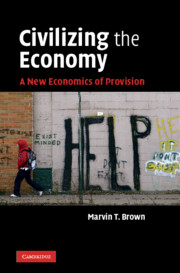Book contents
- Frontmatter
- Contents
- List of figures
- List of tables
- Preface
- 1 Introduction: creating a just and sustainable economy
- Part I Creating a new economic framework
- Part II The civic option
- 5 From property relations to civic relations
- 6 Society, civil society, and the market
- 7 Restoring reciprocity
- 8 Civic norms and market competition
- Part III A civic view of labor, land, and money
- Part IV Civilizing economic systems
- Part V A civic agenda
- Appendix: Free enterprise and the economics of slavery
- Bibliography
- Index
6 - Society, civil society, and the market
Published online by Cambridge University Press: 05 June 2012
- Frontmatter
- Contents
- List of figures
- List of tables
- Preface
- 1 Introduction: creating a just and sustainable economy
- Part I Creating a new economic framework
- Part II The civic option
- 5 From property relations to civic relations
- 6 Society, civil society, and the market
- 7 Restoring reciprocity
- 8 Civic norms and market competition
- Part III A civic view of labor, land, and money
- Part IV Civilizing economic systems
- Part V A civic agenda
- Appendix: Free enterprise and the economics of slavery
- Bibliography
- Index
Summary
The civic sphere is not a stranger to our current economy. As we have seen, the civic undergirds market transactions, serves as the foundation for correcting market failures, and provides a platform for granting property rights. Still, we have not recognized its function as a foundation for providing, protecting, and creating a worthwhile purpose for human communities. To do so, we need to gain a fuller understanding of the social, civil society, and the market. This chapter highlights the character of the civic by contrasting it with the commercial, as well as with the social, and then develops the notion of civil society as our ongoing civic conversations about how we should live together.
THE CIVIC AND THE COMMERCIAL
How should we view the civic and the commercial? Are they similar or quite different? The legacy of Enlightenment economics views them as quite similar, if not identical. Aristotle, on the other hand, presents them as quite different. Let us examine both viewpoints and see which one seems more useful today.
Remember the four stages of history posited by many writers of the Scottish Enlightenment? The final stage of development – the commercial stage – was also the stage of the civic or civil society. Adam Smith and most other Enlightenment scholars consider this identification of the commercial with the civic as a natural development. But at least one of Smith's friends, Adam Ferguson, had some serious misgivings.
- Type
- Chapter
- Information
- Civilizing the EconomyA New Economics of Provision, pp. 69 - 82Publisher: Cambridge University PressPrint publication year: 2010



